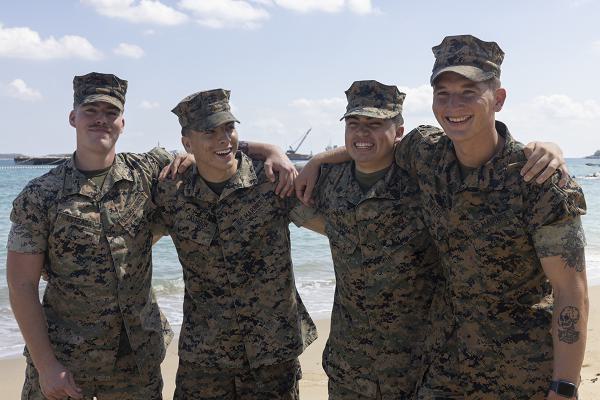
Okinawa, Japan. (October 17, 2024): When a Japanese civilian was injured in a car crash, little did he know he would be treated by U.S. Marines. In this photo by Lance Corporal Nevaeh Segura, these heroes are pictured from the left, Lance Corporal Stephen Estrada, Lance Corporal Samuel Calhoun, Corporal Austin Potter, and Navy Petty Officer 3rd Class Jett Garcia. The troops responded and rendered first aid to a Japanese resident following a brutal car crash on the Okinawa Expressway.
The troops were on their way back to their base at Camp Swab in a taxi when they came upon a truck whose front end was crushed and a citizen was trapped inside. The service members quickly assessed the situation and the team tried to free the trapped driver with a shovel. That being unsuccessful, the Marines resorted to breaking the window to pull him to safety.
After checking the driver’s condition and ensuring he was stabilized, Estrada and Garcia moved the driver away from the vehicle to a safer area until paramedics arrived. The victim was taken to a nearby hospital in stable condition. The Marine’s quick action is credited with saving the man’s life and this was possible due to their combat care training.
Every Marine and Sailor undergoes what is officially called Tactical Combat Casualty Care (TCCC), a set of guidelines for pre-hospital trauma treatment on the battlefield. The course teaches Marines and Sailors how to provide life-sustainment care similar to what a Navy Corpsman would administer until the causality can be treated by a medical professional.
The seven-day course involves short lectures followed by interactive, hands-on training and formal assessments from medical professionals. Topics include rapid casualty assessment, lifesaving medical skills, and critical communication and medical documentation techniques. These life-saving strategies designed for the battlefield are equally useful in providing the best trauma care in an accident.
Support Our Troops congratulates these servicemembers who sprang into action to render aid in the finest tradition of the Marine Corps.


